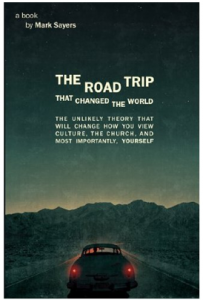Paradoxes exist throughout life within our world. They can be traced back to a fateful day in the first garden on earth. The day the first humans ate from the Tree of the Knowledge of Good and Evil (Gen 2;17; 3:6).
Mark Sayers, in his book The Road Trip that Changed the World
What is the dilemma?
Mark Sayers does a great job of bringing awareness and understanding of a present dilemma within the church. What is it? The impact of secularized culture on the theology and practice of the Christian faith, particularly in America.
This secularization began in earnest following World War II. Sayers tells us theologian Elton Trueblood spoke of it coming in his book, The Predicament of Modern Man
This issue has been addressed by many, yet the problem persists. Sayers helps us understand how it developed and what its impact is at present. This is expressed in the subtitle of the book, The Unlikely Theory That Will Change How You View Culture, the Church, and Most Importantly, Yourself.
"...a new kind of believer would emerge, one who did not need Church or a faith community, but instead who followed a self-constructed form of religion."
Two roads
The book begins with the story of two road trips across America. These road trips are tied to two authors with two very different perspectives on the cultural direction of postwar (WWII) America. Mr Sayers does a great job drawing the reader into the story.
The book is divided into two main sections. These can be summed up by the first two chapters of each section—"A Tale of Two Roads" and "The Road Home."
The paradox of secularism and the Christian faith is developed with surprising parallels and contradictions in the first section. It begins with a road trip and ends at the Cross. This road trip travels through the life and writing of Jack Kerouac, American culture, and the church.
Mr Sayers does a great job drawing the reader into the story.
The Road Home
The "Road Home" starts the second section offering a simple way back out of secularism and into genuine faith. The book ends with the poignant story of Takashi Nagai, a survivor of the initial atomic blast that devastated the city and people of Nagasaki, Japan.
Sayers reminds readers of the choice each believer faces. One choice is the popular road of a shallow form of personalized Christianity. The second and better choice is the road that leads to a deep faith, devotion to Christ, and community of believers who embrace the Cross.
Every believer must choose between the shallow road or the road that leads to a deeper faith
An important read
I read this book during my recent travel to the Philippines. It captured and held my attention well, and I look forward to reading more from Mark Sayers.
It is an important read for any believer, especially those unaware of this dilemma of secularism and faith. It is a must read for those committed to a faith that transcends and transforms culture.
What road are you traveling on?
Is yours a personalized Christian faith, or a deep faith rooted in relationship with Jesus and His church?
I highly recommend The Road Trip that Changed the World





